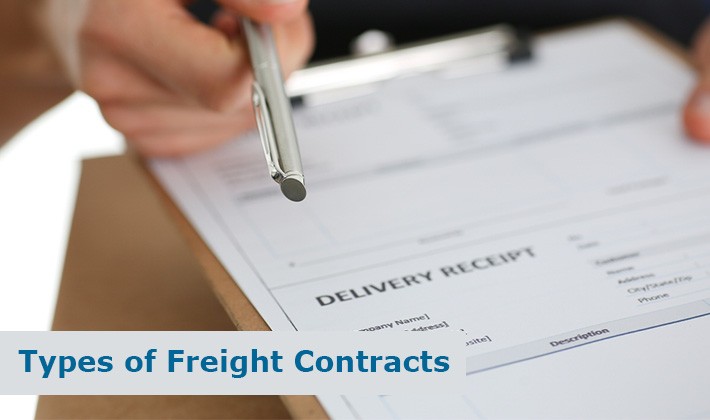
Freight contracts are the cornerstone of your entire procurement process. The rates and terms outlined within them dictate everything from the price you pay to move a product to the effect it has on your bottom line. The more contracts you have, the harder they are to manage. It’s ideal to have a system in place that not only manages your types of freight contracts but also helps you understand, negotiate, and capitalize on them.
Types of Freight Contracts
The purpose of most freight contracts is to discern rates and responsibilities between freight brokers and carriers, as well as liability. That said, depending on the type of agreement and the nature of the business, brokers may find themselves juggling an assortment of contract types:
- Broker carrier agreements are signed after a freight rate is agreed upon. They include a variety of data, such as agreement date(s), pay dates, invoicing procedures, and liability or insurance information.
- Load tenders are detailed agreements about the consignee that will receive freight. Tenders include descriptions of the freight, weights, and measurements, and pertinent contact information.
- Warehouse receipt (WR) A warehouse operator issues a warehouse receipt, which is evidence of the ownership of the products kept in the warehouse. It includes details about the products, such as their amount, caliber, and state. The WR is transferable to other parties and can be used as security for loans.
- Rate confirmations are a form of contract that legally binds all parties to the agreed-upon brokerage rate for freight. These can be ongoing and are often filed and applied to ongoing freight transactions.
- Charter party agreement (CPA) A contract between a shipowner and a charterer is known as a charter party agreement. It describes the charter’s terms and conditions, including the vessel to be utilized, the ports of call, and the time frame. The CPA can be either a journey charter, in which the ship is chartered for a particular voyage, or a time charter, in which the shipowner leases the vessel to the charterer for a predetermined amount of time.
- Accessorial contracts outline any handling charges, detention and wait time fees, refueling costs, or other unexpected charges that come with moving freight. These contracts acknowledge accessorial costs and set protocols for them.
- Bill of lading (BOL) is less a contract and more of a receipt, signifying the delivery of freight. A BOL is a legally binding document once signed and filed. Learn more about the bill of lading in our another article.
- Air waybill (AWB) The bill of lading and the air waybill are equivalent documents used for air freight shipments. It includes details about the shipment, the consignee, the carrier, and the cargo. The AWB cannot be transferred to anyone other than the consignee because it is a non-negotiable document.
- Multimodal transport document (MTD) Shipments involving several modes of transportation, such as air, sea, and land, require a multimodal transport document. It comprises details on the goods and the various forms of transportation that are utilized, and it acts as a contract between the shipper and the carrier. When the cargo is delivered, the consignee must accept the MTD, which is issued by the carrier.
These documents are of crucial importance to both freight brokers and carriers. Brokers especially need a way to categorize, confirm, and recall these documents, for purposes of accuracy during account reconciliation and/or brokering new runs.
Centralized Management for Freight Contracts
The problem with managing freight contracts isn’t just how many of them there are across all carriers and vendor partners. It also extends to amendments, situation-based rate changes, freight-specific terms, and much more.
Simply put “Freight contracts are subject to change, and updating them accordingly is paramount. There are different types of freight contracts and learn how to manage them more effectively in our other article.
The first and most important step for better contract management is centralization. Centralization not only creates a manageable filing system for contracts but also enables quick reference and comparison between contracts, for optimal booking and better decision-making. nVision contract management services offer the best way to manage your contracts effectively.
Centralization also enables better auditing and reconciliation for various carrier accounts. For example, searching a centralized contract database against amounts on a BOL can quickly yield insight into major discrepancies or help brokers determine out-of-tolerance variables.
Smarter Negotiations
Better management of freight contracts — such as comparing BOLs, load tenders, and accessorial contracts against well-kept records about your relationship with a specific vendor — will help you negotiate them more effectively in the future. Discerning trends, errors, and critical variables gives you leverage when re-working contacts or helps inform negotiations on new contracts.
You may decide to drop carriers that have consistent issues across their invoicing in favor of better rates with more accurate carriers. Likewise, you may drop small carriers in an effort to consolidate business into larger vendors. Having this data readily available via a centralized contract management system unlocks a world of possibilities regarding contract negotiations.
Armed with the right data in an accessible mode, freight brokers will be able to make insights that benefit their bottom line.
